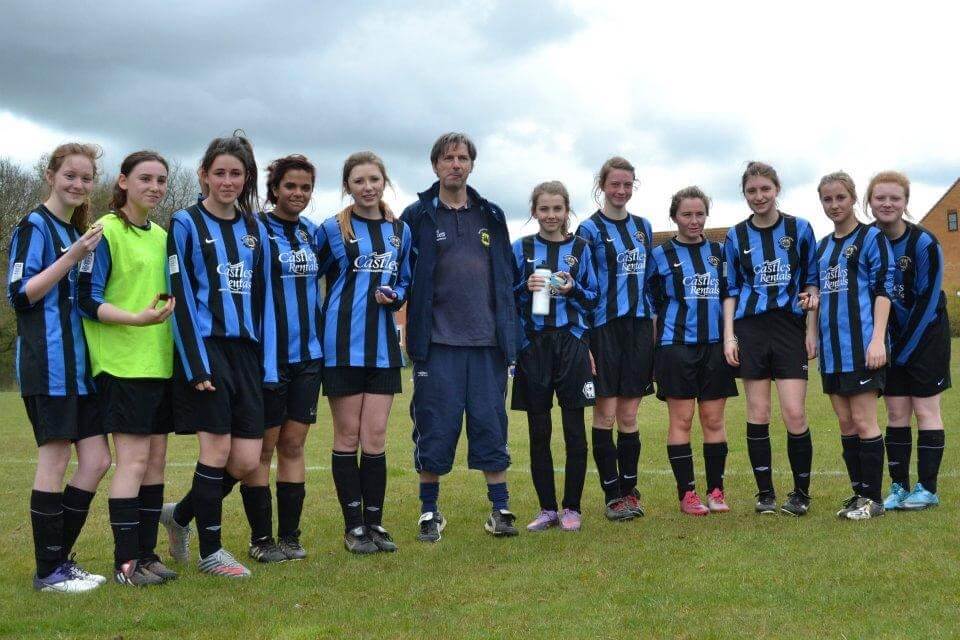History of Raiders Girls’ Football
With 275 female players, Berkhamsted Raiders is, according to the FA, the largest football club in the country for female youth football. However, we’re not resting on our laurels and we aim to grow our number of female players to 500 by 2025.
Our first female player, Molly Beard, started playing in 2003 and was followed the year after by Anna Popescu in the year below. However, it wasn’t until 2008 when Raiders was able to field its first girls’ team in the U13 age group and played in the fledgling Herts Girls Football Partnership League, coming second
By 2012, girls’ football at Raiders had grown in popularity and there was the hope of 8 teams being entered into the HGFPL league the following season but, by 2013, numbers had dwindled and there were just four teams ranging from U9s to U12s. The 2014 season saw numbers increase to 5 teams which was the start of the rise of girls’ football at Raiders, with the World Cup of 2015 raising the profile of the sport and more girls showing interest in playing. Playing numbers continued to increase to today where we now have 22 female teams playing across all age groups.
The story of how we went from one player to 275 is built on the efforts of a small army of volunteers, male and female, and as we celebrate International Women’s Day and Women’s History Month, we wanted to tell the story of our growth through the words of some of the women who were instrumental in delivering it.
Carolyn Beard – Trustee
With 3 children involved in Raiders, the Beard family were an active and integral part of the story of the success of Raiders today. We caught up with Carolyn recently to get her view on the growth of the club and her involvement in the girls’ development:
“Raiders was a total immersive experience for our family with 3 children involved at various stages, starting with our eldest child Ben who got involved at U8 alongside his father Paul. In 2003, Molly was the first girl to play football at Raiders. At the age of 7, she was keen to play 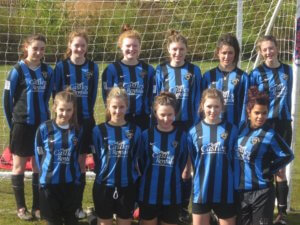 football like her older brother Ben – so keen in fact, she was happy to be the only girl playing in the U8 team being set up by Paul Russell.
football like her older brother Ben – so keen in fact, she was happy to be the only girl playing in the U8 team being set up by Paul Russell.
By 2007, when Molly reached 11, she was no longer able to continue playing with the boys, which was when her Dad, Paul, persuaded Tim Harris to start a girls team at Raiders so the girls could continue to play football.
After my husband, Paul, passed away, I joined the Club’s Board of Trustees to manage the Memorial Fund that
was set up in his memory and then continued to have a wider non-executive role within the club. One of my roles was to support Sarah Whale as the new head of girls’ football. We did a lot of research on girls’ teams in other sports, such as rugby, and identified that the social and community aspect of playing as a team was key. We recognised that we needed to develop a home for girls’ football, and it was fantastic when we identified and delivered Bridgewater School as the perfect base.
Being at Bridgewater School really helped build the community and social aspects of the girls’ football programme. Younger girls could see older girls playing on pitches next to them and be around their friends which was a key driver in encouraging girls to take up and stay in the game. Another aspect that we considered important was to strengthen the link between coaching and matches. The girls weren’t generally as immersed in football as the boys, so we proposed additional coaching for match days and that had a great benefit to the teams.
As my involvement with the club reduced over time, it’s incredible to think how the club has grown from such humble beginnings. I look back with pride when remembering the tournaments played the Cricket Club on Kitchener’s Field, seeing all the boys and girls playing games in every corner of the field and having fun.”
Molly Beard – Player
Molly was the first girl to play football for Raiders and we recently caught up with her to ask her about her time with the club, what she enjoyed and why she eventually drifted away from football:
“I was really keen to join Raiders and play football as I wanted to be just like my brother Ben (don’t tell him I said that!). As
there weren’t any girls’ teams my dad organised it for me to join the U8 boys’ team that was managed by Paul Russell. This had the added benefit that as they played on a Sunday I didn’t have to go to church (don’t tell my Grandma I said that!).
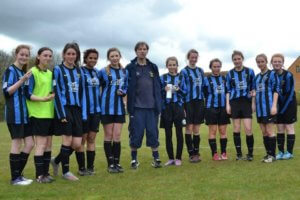
As soon as I joined the boys’ team at U8 I was made to feel like one of them. I wasn’t conscious of being the first girl in Raiders to play football or even being a girl in a boys’ team. I don’t recall playing against too many girls in other teams, so it was a bit of a rarity. In fact, the only time I ever became aware of it was when I was having a particularly good game in defence, and I remember one of the opposition parents shouting to their son: “Why can’t you get past her, she’s only a ****ing girl!”. I must admit I particularly enjoyed winning that game!
When I was about 10, I was invited to join the Watford Girls’ academy and I had a great time there lear
ning new skills and developing. I remember Ben Foster coming to Raiders during that time and I was very pleased to score a penalty against him! Unfortunately, I got a bad hamstring injury around that time which impacted my playing time, and I didn’t get called back for a second season. I maybe regret not giving that another try, but it was a great experience! Within Raiders I was able to play in the boys’ team until about 11 or 12 and then FA rules stipulated that I couldn’t play any longer in a mixed team. At this point my dad, who was the chairman at the time, persuaded Tim Harris to set up a girls’ team as, by then, we had a few more girls playing across different ages, including his daughter Helen. I was able to combine playing with boys and girls teams for a little while before having to focus solely on the girls’ teams.
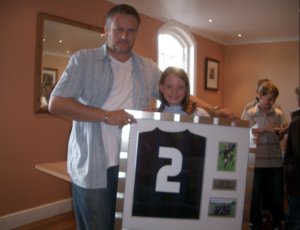
It was a different experience playing in a girls’ team, versus the boys, as the experience and skills level of the girls was very different, and it took a little getting used to. Some of the girls were really good and had been playing a little while and others were new to the game and were doing more basic skills training to improve, which they did very quickly. However, what stood out for me was the social side of it. There was much more camaraderie and enjoyment playing with friends and the team all got better together, although Tim might say we spent too much time chatting and not enough time listening to him!
I carried on playing football until U15s but by this time I was combining it with playing hockey, which I really enjoyed as well. Quite often I’d be juggling hockey matches straight after football or the other way round and it became more challenging to manage, not just for me but for my mum who had to drive me everywhere!
Over time, I drifted more towards hockey, than football, as I could see more of a pathway to keep on playing. From quite a young age I was tending to play more with women than girls which improved my game, and I didn’t have a comparable opportunity in football. I was also going through a tough time for a while, with my Dad passing away around this time, and I found the team environment, with older players, more supportive. I carried on playing hockey through University and still play now living in London which I may not have been able to do with football.
Looking back, I really loved my time in Raiders, especially the tournaments and the social aspects of the game, including our team tour to the Isle of Wight. I’m grateful for all the opportunities, and my teammates, coaches and managers who supported me, including Tim Harris, Steve McHugh and Paul Russell to name a few.”
Sarah Whale – Head of Girls’ Football
Sarah Whale has had a varied ‘career’ within Raiders working across many different areas. She was a key player in setting the strategy for the development of girls’ football and we chatted with her recently to get her side of the story:
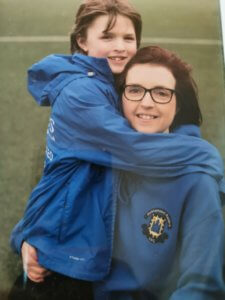
Sarah and Annie
“At the end of my 3rd season with Raiders managing club welfare and introducing the FA Respect campaign, I remember having half an eye on the girls’ section of Raiders. The four teams were struggling with numbers, there was no sense of community spirit and I could see that it was at risk of folding. Seeing little team sports for girls locally I felt we had a massive opportunity to not only save the section but also create a place for local girls to come together in a team sport.
At the start of the 2015/16 season, we had 40 girls and 4 teams playing football. By the end of the 16/17 season, we had 12 teams and 160 girls. The oldest age group at that time was U13.
The strategy that created this change was driven by really trying to think about what the girls would want from their experience. Carolyn Beard (mum to Molly mentioned earlier) supported me enormously to think this through. We believed the girls wanted a sense of belonging and an opportunity to learn new skills in a safe nurturing environment. We created their own home at Bridgewater so they could all play together, organised social events, pre-season mash-ups, fitness sessions, bring-a-friend training sessions, awarded girl role models and appointed girls coaches. Some fantastic women stepped up into managerial roles; Mary Pacitti, Nicola Everitt, Martina Hardy and Jude Hardy which added to the genuine community feel.
A very fond memory I have is one Saturday morning we invited one of the Raiders boys’ teams over for the first ever girls versus boys match. I was so proud of the boys and the girls that day. The boys did not hold back yet they treated the girls with respect. The girls gave it everything and tried their darndest to win. The boys just edged it on the day but were on the receiving end of a few crunching tackles and at least one goal-mouth panna. I think it was that day that the boys’ parents who visited us at Bridgewater realised the girls were not there to tick the club diversity boxes but actually they really were Raiders footballers. More than one parent commented: imagine if these girls had been playing football from a very early age, the score line would have been very different.
Sadly, community football doesn’t have the luxury of spare cash which we see in the upper echelons of professional football. Without funds you are 100% reliant on people volunteering to support grassroots football. I think it is fair to say that the two years of long hours of implementation and issue resolution, whilst holding down a tough full-time job, really took its toll on me and my family and in the end, I had to step down. I look back with great pride at what we delivered for the local girls and watch closely the progress it is making as the current team drives the Girls’ Section to great heights.”
Mary Harris – Manager
Mary was our first female manager within the club when she stepped in to manage her daughter’s U14 team in its first year. We spoke to Mary about her experiences managing a team for the first time and some of the highs and lows.
“I first got involved when my eldest daughter, Madeleine, had managed to get a group of her friends together to make a team. Our second eldest daughter, Helen, had already started playing with Molly in a team the year before, which was managed by my husband Tim, so I was roped in to managing Madeleine’s U14 team, despite not having any type of background (or interest) in football beforehand. In fact, at one point, we had all 4 daughters playing football for Raiders which was a logistical challenge!

Berko Belles
As a teacher it was relatively easy to transfer over to being a team manager in terms of organising the matches and getting the attention of the girls to be ready for the games. What I lacked in football knowledge I made up for with enthusiasm, a blatant disregard for the scoreline and a great assistant manager in Stephen Spall! What helped was taking my FA Level 1 Coaching qualifications to improve my footballing knowledge although it was an interesting sign of the times being the only woman in a group of 25 people on the course.
We joined the Thames Valley Football League but as there were very few female teams, we were playing teams from quite a distance that involved a lot of travelling. However, there was a lot of fun had on the journeys to and from matches and it felt like the social aspects and bonding was more important than the games themselves.
Whilst the girls enjoyed winning, they weren’t too upset if they lost, which was a good thing as with no divisions within the league, there was a wide range of skills and we were on the receiving end of quite a few heavy defeats from teams that seemed to take it a lot more seriously than we did. In fact, it took 2 seasons and a total goal difference of -232 before, in 2011, the now U16 Belles recorded their first win when they beat Bedmond Ajax by a glorious 2-0!! The sense of elation and delight from everyone was amazing and I never thought I’d ever be as excited about a football game as I was that day.
Madeleine herself recalled that despite usually heading into half-time around 15 goals down, they’d always put their hands together and agree that we’d start the second half with a ‘clean slate’. In their heads, it was 0-0 again, and they’d run back out with renewed vigour and with the optimistic (and possibly deluded) energy of a team predicted to win the Premier League!
The next season, we moved in to an U18 league, as there wasn’t an U17 version and it was again challenging playing against teams who took it far more seriously with varying degrees of what constituted fair play and sportsmanship. We also faced challenges with getting teams together as, for many of the girls, we were competing with the lure of earning money with Saturday jobs.
Looking back, it was a brilliant experience end to end, it was great to be able to enable the girls to get out and do sport, spend time with their friends, on and off the pitch and get better together as a team. I’m grateful to all at Raiders for being open-minded and supportive to give us the freedom to set up our girls teams.”
